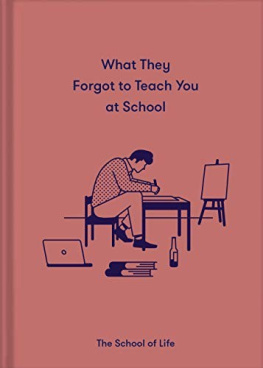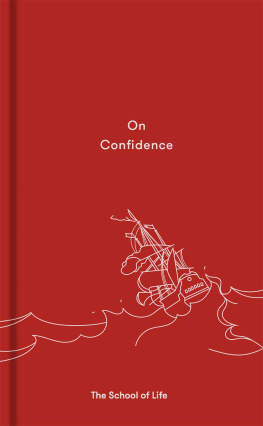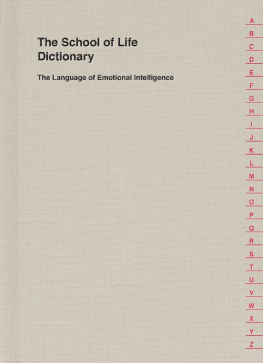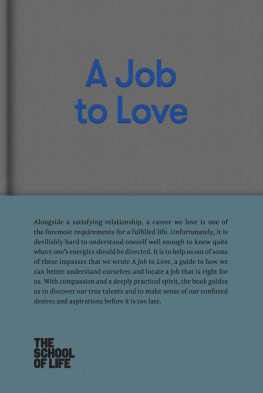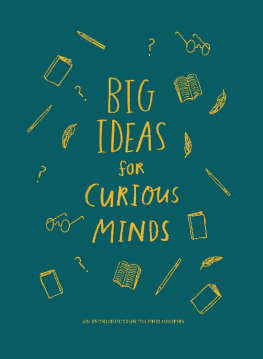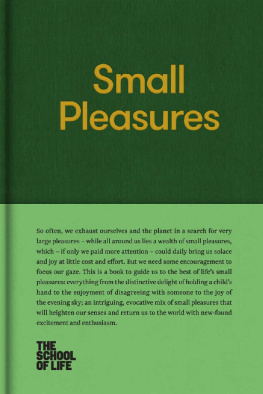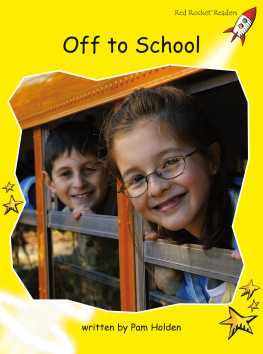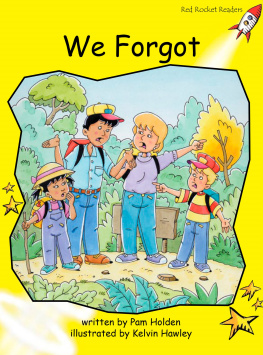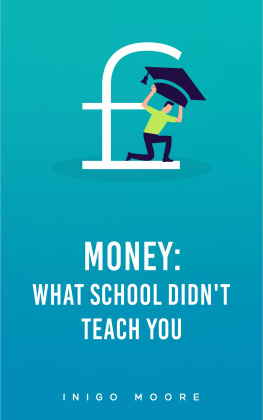The School Of Life - What They Forgot to Teach You at School
Here you can read online The School Of Life - What They Forgot to Teach You at School full text of the book (entire story) in english for free. Download pdf and epub, get meaning, cover and reviews about this ebook. year: 2021, publisher: The School of Life Press, genre: Home and family. Description of the work, (preface) as well as reviews are available. Best literature library LitArk.com created for fans of good reading and offers a wide selection of genres:
Romance novel
Science fiction
Adventure
Detective
Science
History
Home and family
Prose
Art
Politics
Computer
Non-fiction
Religion
Business
Children
Humor
Choose a favorite category and find really read worthwhile books. Enjoy immersion in the world of imagination, feel the emotions of the characters or learn something new for yourself, make an fascinating discovery.
- Book:What They Forgot to Teach You at School
- Author:
- Publisher:The School of Life Press
- Genre:
- Year:2021
- Rating:3 / 5
- Favourites:Add to favourites
- Your mark:
- 60
- 1
- 2
- 3
- 4
- 5
What They Forgot to Teach You at School: summary, description and annotation
We offer to read an annotation, description, summary or preface (depends on what the author of the book "What They Forgot to Teach You at School" wrote himself). If you haven't found the necessary information about the book — write in the comments, we will try to find it.
What They Forgot to Teach You at School — read online for free the complete book (whole text) full work
Below is the text of the book, divided by pages. System saving the place of the last page read, allows you to conveniently read the book "What They Forgot to Teach You at School" online for free, without having to search again every time where you left off. Put a bookmark, and you can go to the page where you finished reading at any time.
Font size:
Interval:
Bookmark:
What They
Forgot to Teach
You at School
What They
Forgot to Teach
You at School
The School of Life
Published in 2021 by The School of Life
First published in the USA in 2021
70 Marchmont Street, London WC1N 1AB
Copyright The School of Life 2021
Cover illustration Andrei Verioti
Designed and typeset by Marcia Mihotic
Printed in Latvia by Livonia
All rights reserved. This book is sold subject to the condition that it shall not be resold, lent, hired out or otherwise circulated without express prior consent of the publisher.
A proportion of this book has appeared online at www.theschooloflife.com/thebookoflife
Every effort has been made to contact the copyright holders of the material reproduced in this book. If any have been inadvertently overlooked, the publisher will be pleased to make restitution at the earliest opportunity.
The School of Life is a resource for helping us understand ourselves, for improving our relationships, our careers and our social lives as well as for helping us find calm and get more out of our leisure hours. We do this through creating films, workshops, books and gifts.
www.theschooloflife.com
ISBN 978-1-912891-78-8
10 9 8 7 6 5 4 3 2 1
The modern world treats education with unique seriousness. Never in the history of humanity have so many resources and so much thought been devoted to the development of the minds of the next generation. In all advanced nations, until a human is twenty-one or so, there is little else to do other than study. In sensible households, homework has a close to holy status. An army of teachers and educators, colleges and pedagogical bureaucrats is set up to feed industrial quantities of the young through the school machine. Politicians on every side of the spectrum outstrip each other to prove their devotion to the educational cause. The big government-mandated examinations claim a power to determine the course of our whole lives; the dread they provoke can be felt in dawn terrors decades after the event. It may, in rare, tragic but telling instances, feel like there is simply nothing left to live for if the grades go wrong.
And yet despite all this, it is very rare to find a thoughtful adult who by middle age or earlier does not at certain moments of crisis look back in a somewhat puzzled way at their school years and wonder why, amidst all the study, the discipline and the earnest commitment, so much managed to be passed over in silence. How, in all those hours sitting in classrooms, did certain fundamental concepts ones that are so important to a halfway decent life slip through the net? How come there was so much time for calculus, the erosion of the upper glacial layer, the politics of the Burgundian states of the 1400s, the poetry of Emily Dickinson and trigonometric equations, and yet so little time for a range of puzzles that render grown-up life so tricky? Why in short did no one ever tell us?
There are, at present, few places where this thought can go. The debate is overwhelmingly focused on how best to deliver an education to children, not what they should be educated in. School curricula are not reverse engineered from the actual dilemmas of adult life. The subjects in the timetable, and their distribution across the week, in no way reflect what will actually go on to make life a trial; otherwise, we would be hearing a lot more from our teachers about how to approach the dilemmas of relationships, the sorrows of our careers, the tensions of families and the terrors of mortality To the surprise of any visiting alien, humans blithely educate themselves as if the chief requirement of adulthood were the possession of a set of technical skills, with no acknowledgement of the fact that what mostly runs us into the sands is not any shortfall in our command of matrix algebra or the French pluperfect but our inability to master what we could call the emotional dimensions of our lives: our understanding of ourselves, our capacity to deal with our lovers, children and colleagues, our degrees of self-confidence, our handle on calm and self-compassion. It is failures in these zones that, far more than anything we might pick up at the best schools and universities, ensure the repeated betrayal of humanitys best hopes for itself.
When we turn over the thought of what we should have learnt, it typically feels far too late, and far too hopeless. We meekly assume that it must simply be impossible to teach ourselves the sort of emotional skills whose absence we pay such a heavy price for, impossible to instruct anyone in love or wisdom, fulfilment or kindness. The cost of this kind of resignation is vast. It means that every new generation must collide afresh with problems that are, in theory, already worked out in the minds of their predecessors. Every young person is compelled once again to discover, in midnight sobs, what is already theoretically very well known about ending relationships, finding a career or dealing with damaged but well-meaning parents. We force ourselves to reinvent the wheel and rediscover fire. At school, the focus on those glaciers and laws of motion becomes an unwitting excuse not to learn the laws of kindness or the principles of family harmony. Learning about the struggles at court in early modern Europe blinds us to the need to make time to learn the history of our own anger or despair.
It is in this context that The School of Life sets itself up, both in its name and its practical activities, as a provocation: a reminder that the task of a school must stretch far beyond the current agreed curriculum to encompass everything with the power to wreck an adults life. The emphasis on the word forgot in the title is not coincidental; it draws attention to the essentially haphazard ways in which we have let important topics fall outside the educational remit. There is no conspiracy that would almost be easier it is just a form of oversight and happenstance. There is no good or interesting reason why we have to wait quite so long to discover lessons that might have made such a difference nor is there a need for every one of us to stumble around in such darkness when brightly illuminated accounts and theories already exist.
Some of what we have to suffer is unavoidable; the premise of The School of Life is that a lot more trouble than we might ever have dared to hope is, with the right sort of homework in hand, capable of being sidestepped.
We could hardly expect it to do anything else, but one thing that school has an unparalleled genius for is subtly but powerfully enforcing the message of how important a role it should play in any well-lived life. In small ways and large, it teaches us that those who most faithfully follow its dictates will prosper and, correspondingly, that those who insist on doubting, rebelling, cursing and defying it will founder. From a hugely impressionable age, we have it impressed on us that school is the ultimate arbiter of who will succeed and who must go astray.
When worried parents try to tame their fears as to what will ultimately become of the precious and vulnerable little person they have succeeded in putting on the earth, performance at school is (understandably) clung to as the one reliable marker that things are going to be well. The infinite worries about the childs health, money, status, love, friendship, reputation promise to be tamed if only the young one can be coaxed into doing their homework on time. Parental nagging is the result of existential terror settling on the one element that, at a given point, suggests it has a power to guarantee the future: the end of term result. What inner robustness one would need to possess not to delight when the history teacher explains that an offspring has shown a real aptitude in the civil war quiz, or not to panic when the head of maths reveals a sloppiness when finishing distribution graphs. The machinery of school, with its buildings, rituals and teachers, isnt just imparting a few state-governed certificates to us; it also claims to hold in its hands the essential curriculum of life.
Next pageFont size:
Interval:
Bookmark:
Similar books «What They Forgot to Teach You at School»
Look at similar books to What They Forgot to Teach You at School. We have selected literature similar in name and meaning in the hope of providing readers with more options to find new, interesting, not yet read works.
Discussion, reviews of the book What They Forgot to Teach You at School and just readers' own opinions. Leave your comments, write what you think about the work, its meaning or the main characters. Specify what exactly you liked and what you didn't like, and why you think so.

